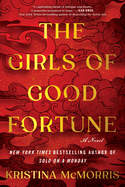
As she struggles to survive in Portland, Ore., a stoic young Chinese woman passing as white after the passage of the 1882 Chinese Exclusion Act endures life-threatening racism in The Girls of Good Fortune. In her propulsive eighth novel, Kristina McMorris (Sold on a Monday) tracks one family's fate and shines a light on the brutal treatment of immigrants recruited to build railroads to the western United States. McMorris's fiction is brimming with details of time and place; she captures the seedy aspects of western expansion and the vibrant stories of characters whose experiences molded the nation.
Celia Hart cautiously conceals her Chinese heritage by using her mother's maiden name instead of her father's surname, Chung. She lives alone after her mother died and her father left for a job in a Union Pacific Railroad coal mine, and she works as a housekeeper for the snooty Portland mayor's family. Her life takes a calamitous turn when white laborers massacre the Chinese miners and she and the mayor's son, to whom she's secretly engaged, conceive a child. Celia's courage supports her as she is dismissed from the mayor's mansion, becomes a housekeeper at the Dewdrop Inn brothel, shelters her beloved baby daughter, and survives her kidnapping from Portland's notorious Shanghai tunnels.
Surprisingly generous characters assist Celia, including the stern madam and kind ladies of the Dewdrop Inn, and a fellow "shanghaied" with Celia and forced into enslaved shipboard labor. Even when it seems unlikely that Celia will find "good fortune," readers will remain hopeful, as Celia does, for a satisfying ending. --Cheryl McKeon, Book House of Stuyvesant Plaza, Albany, N.Y.

